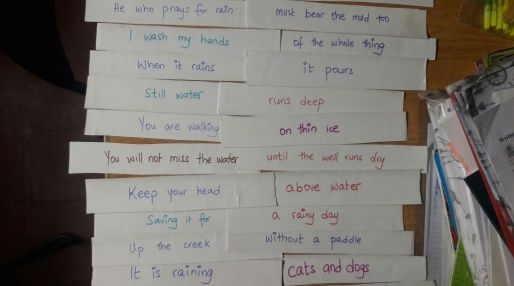In the last week since I have started my second year of teaching, many people have asked me the same question. Are you (as) excited about this year? Hopefully, this piece is part in answer to that repeated query and part a sneak peek into what the start of this term has been like.
Am I excited? Yes. Am I excited about the same things? Far from. Last year, my questions were more basic – would I be able to teach? Would I be able to don the persona of a teacher? Would I be able to handle the more difficult aspects of a class – discipline, routine, the demanding nature of correction? Would I be able to make the jump from volunteer to full-time? That was June 2016.
This year, my questions are a little different. Would I be able to keep everyone interested, myself included, after the initial excitement of a new teacher wore off? Fresh from the high of getting one set of kids through boards, would I have the mental strength to start from the very beginning with another set of kids? Would I be able to stay fresh, open, and willing to mould myself, avoiding approaching the classroom with a been-here-before frame of mind? With my class sizes larger this year, would I be able to give each kid just as much attention as the last set?
Truth be told, I don’t know the answers to these things yet. It has only been a week since I began after my post-boards break, and it is still much too early. As I sit down to make lesson plans this year though, I know that my motivation to shake things up a little and keep things interesting are influenced by a new factor – sure, the kids should be involved and interested, but so must I. Changing things around means I do new things in my classes. It is good for me too.
This term, the middle school kids are working around the elements of water, wind, and the sun. Though there is a specific focus on energy in the sciences, it is slightly less direct in English. Not wanting to inundate them with literature through the term again (last Project Day was fun!), I was hunting for something to do around water, when I chanced upon a very helpful book titled something along the lines of ‘Water: An ESL curriculum’ and milked the few pages that Google Books gave me as a preview. I decided we’d largely do vocab exercises with water.

The number of phrases, saying, proverbs, what-have-you in English that have to do with water is a little mindboggling if you think about it. In preparation for the class, I wrote each line on a strip of chart paper and then proceeded to cut each of them in half. Each child chose two halves and then proceeded to walk around class trying to find the missing part of their saying, the one that made the most sense. We then sat down and understood the meanings of each of them, using the more common ones in examples of our own. Some of the stories that came up were:
- When I first came to this school, everyone spoke in English. The teachers also spoke in English. I did not understand what anyone was saying. I felt like a fish out of water.
- When I went to Kanyakumari, I felt like a fish out of water. I had never seen the ocean before and I had never gone to the beach. I did not know what to do there.
- The first time I went to the movie theatre in Coimbatore, I felt like a fish out of water. I had never seen such big buildings and big bridges [flyovers] before.
- If you want to hit a six in cricket but you do not have a bat or a ball, it is like going up the creek without a paddle.
- If you only have a piece of chalk but the classroom has a whiteboard, using the board to teach is like going up the creek without a paddle.
We also spoke of it raining cats and dogs, saving things for a rainy day, the tip of the iceberg, and so much more! If the first week is anything to go by, we are up for an exciting year ahead!